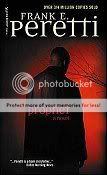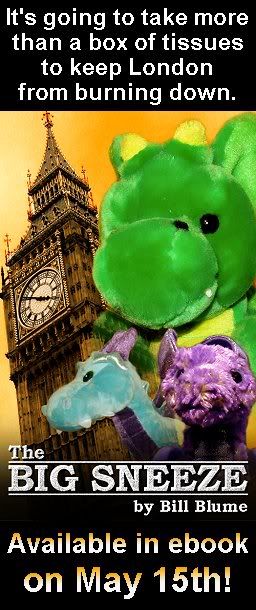
Perhaps the most influential book on my writing was a work of religious fiction, a genre I generally find lacking. Frank E. Peretti’s book This Present Darkness was released back in 1986 and offered up one of the most intriguing interpretations of spiritual warfare.
 There’s little doubt that the concept behind this book is the best part, so I’ll discuss that a bit. We’re given the standard armies of the angels and demons. Demons attach themselves to people who aren’t saved, taking advantage of their spiritual weaknesses such as lust or the like. The angels draw their strength from the prayers of God’s human followers. The greater the prayers and the greater the belief of the person praying, the more powerful the angels become. Now, the angels are by far the coolest characters in the book. These aren’t your cheezy harp-playing, diaper-wearing, little cherubs. No, we’re talking more like Navy SEALS with wings and swords… well, almost. They don’t curse, of course, and they don’t drink… Well, come to think of it, they’re more like Navy SEALS with wings and swords and Boy Scout values. Regardless, they’re pretty damn—er, darn cool.
There’s little doubt that the concept behind this book is the best part, so I’ll discuss that a bit. We’re given the standard armies of the angels and demons. Demons attach themselves to people who aren’t saved, taking advantage of their spiritual weaknesses such as lust or the like. The angels draw their strength from the prayers of God’s human followers. The greater the prayers and the greater the belief of the person praying, the more powerful the angels become. Now, the angels are by far the coolest characters in the book. These aren’t your cheezy harp-playing, diaper-wearing, little cherubs. No, we’re talking more like Navy SEALS with wings and swords… well, almost. They don’t curse, of course, and they don’t drink… Well, come to think of it, they’re more like Navy SEALS with wings and swords and Boy Scout values. Regardless, they’re pretty damn—er, darn cool.Peretti created an intricate story for this book, another thing I liked about This Present Darkness. He almost has to, because even as we’re following the spiritual battle, we’re watching a parallel conflict within the mortal world. What’s fascinating is how Peretti takes all these separate threads and slowly ties them together. The angels can’t win their battle without the aid of the Christian faithful and vice versa. Much as I praise this plot, I honestly remember nothing about the specifics. I read this book back in high school, so it’s hard to remember much. Essentially, it’s a battle for the collective soul of the town of Ashton. At stake in the mortal world is the purchase of local Whitmore College by the shadowy Omni Corporation.
 The ending is a bit tricky, maybe even a bit too saccharine and over the top. I think Peretti handled the ending to the sequel, Piercing the Darkness, better. The mortals essentially realize the demon involvement, and it just comes across a little too easy for all these people to accept it.
The ending is a bit tricky, maybe even a bit too saccharine and over the top. I think Peretti handled the ending to the sequel, Piercing the Darkness, better. The mortals essentially realize the demon involvement, and it just comes across a little too easy for all these people to accept it.One thing Peretti does well is make the book move very quickly. I certainly didn’t get bored with this book. The sequel turned out even better. I do wonder about the quality of the writing, though. Frankly, I’ve found most religious fiction just isn’t that well-written. I read Peretti’s work long ago, so I obviously couldn’t bring a writer’s eye to bear on it. Unfortunately, I can say I never quite enjoyed his work beyond This Present Darkness and Piercing the Darkness. I read his book The Oath, and even though I finished it, the book just didn’t work for me. When I tried to read his novel Prophet, I couldn’t get very far into it. For Prophet, Peretti did research into how local news operations work, but speaking as a former television news producer, I just couldn’t find his interpretation credible. I had to put the book down without getting very far into it, and I’ve never felt any desire to read it since. The latter two books turned me off enough that I’ve not tried to read anymore of Peretti’s books.
Other Books by Frank E. Peretti:




As fascinating as I found Peretti’s concept within This Present Darkness, I always wanted to take it one step further. Much of my early writing was an effort to couple his idea of an invisible war between Heaven and Hell with a CIA counter-terrorism action-adventure. I don’t know that I ever succeeded in making it work, and I don’t think it was simply a matter of my writing skills not being up to the task. Part of Peretti’s secret to making these two books work is that he makes the ordinary world into a fascinating place by showing us what’s possibly happening without us ever seeing it. The more I worked on the counter-terrorism adventure tale, the less the parallel spiritual war worked. The real world battle already held enough intrigue and excitement that I think the spiritual war actually took away from it and over-complicated the plot. I don’t consider those early efforts wasted, though. They’ve given me a wealth of characters and story ideas to draw on for later works. This is probably the best praise I can give Peretti, that he inspired me as a writer and, in many ways, continues to.













No comments:
Post a Comment